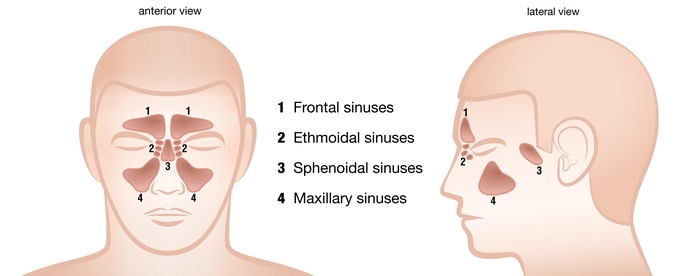Nose cancer (paranasal sinus and nasal cavity cancer)
Key facts
- Nose cancer is cancer that develops in cells within your nasal cavity or paranasal sinuses or both.
- Some symptoms include a decreased sense of smell, a blocked nose, nose bleeds and headache or facial pain.
- Risk factors for nose cancer include smoking, drinking alcohol and breathing in certain dusts or chemicals.
- Treatment options include surgery, radiation therapy, chemotherapy or a combination of these treatments.
What is nose cancer?
Nose cancer can develop in both the nasal cavity and the paranasal sinuses. Your nasal cavity is the air-filled space behind the nose. Your paranasal sinuses are air-filled spaces at the front of your skull. A type of cancer called squamous cell carcinoma starts in the cells that line the nasal cavity and paranasal sinuses. Adenocarcinoma, another type of cancer, arises from the small gland cells throughout the sinuses.
Skin cancers usually affect areas of the skin that have high exposure to the sun. You may develop a type of skin cancer like basal cell carcinoma or squamous cell carcinoma on the external skin of your nose. These are different kinds of cancer than the cancers involving the nasal cavity or the paranasal sinuses.

What are the symptoms of nose cancer?
The symptoms of nose cancer vary, depending on where exactly the cancer is, how big it is and how much it has spread.
Common signs and symptoms of nose cancer include:
- decreased sense of smell
- blocked nose that doesn’t clear
- pain or pressure behind the nose near the upper teeth
- nose bleeds — especially if only on one side
- a lump or sore on the face, or in the nose or mouth
Other symptoms include:
- frequent headaches or pain in or around the sinuses
- facial numbness or tingling
- eye swelling or visual problems
- painful or loose teeth
- pain or pressure in the ear
CHECK YOUR SYMPTOMS — Use the Symptom Checker and find out if you need to seek medical help.
What causes nose cancer?
There are various risk factors that make you more likely to develop nose cancer. These include:
- smoking, using ‘smokeless’ tobacco-like snuff or chewing tobacco
- drinking alcohol
- breathing in certain dusts — like wood or leather dusts — or certain chemicals
Nose cancer is more than twice as common in males than in females. It is also more common in people over the age of 45.
When should I see my doctor?
You should see your doctor if you have any symptoms of nose cancer for more than a few weeks.
FIND A HEALTH SERVICE — The Service Finder can help you find doctors, pharmacies, hospitals and other health services.
ASK YOUR DOCTOR — Preparing for an appointment? Use the Question Builder for general tips on what to ask your GP or specialist.
How is nose cancer diagnosed?
To make a diagnosis of nose cancer your doctor will ask you about your medical history and then examine you. Your doctor may order several tests. Not every person has to do every test. Some tests include the following:
- A nasal endoscopy — your doctor uses a very small, thin, flexible tube with a light and camera on the end of it to look in your nose.
- A biopsy — your doctor takes a small sample of the suspected cancer and sends it to a lab to check for cancer cells.
- Various scans may help diagnose your condition, including a CT, MRI or PET scan.
How is nose cancer treated?
To diagnose nose cancer, your doctor will discuss treatment options with you. The most suitable treatment plan will depend on the type, size and location of the cancer as well as whether the cancer has spread and your medical history.
Treatment options include surgery, radiation therapy, chemotherapy or a combination of these treatments.
Can nose cancer be prevented?
Cancer can’t be fully prevented, but you can reduce your risk of developing nose cancer by not smoking, avoiding alcohol and avoiding exposure to various dusts and chemicals, especially in the workplace.
Complications of nose cancer
Possible complications from nose cancer treatment include:
- Changes to you your sense of smell and taste — this can affect what foods you can eat and enjoy eating. It can also contribute to a loss of appetite and weight loss.
- Hearing loss — certain chemotherapy drugs, radiation therapy and some surgeries can cause temporary or permanent hearing loss.
- Mouth problems (mucositis) — mouth sores and ulcers are common side effects of chemotherapy, and radiation therapy and can make eating, swallowing and talking difficult.
- Significant changes to your appearance — sometimes surgery to remove cancer means removing part of the nose or skin. Reconstructive surgery or protheses may be used in some cases.
- Lymphoedema — in some cases, surgery or radiation therapy can damage lymph nodes and may cause swelling.
Resources and support
Call healthdirect on 1800 022 222 at any time to speak to a registered nurse (known as NURSE-ON-CALL in Victoria) for more information and advice.
For more information about the symptoms, diagnosis and treatment of nose cancer, see the following websites:
Learn more here about the development and quality assurance of healthdirect content.
Last reviewed: November 2023










